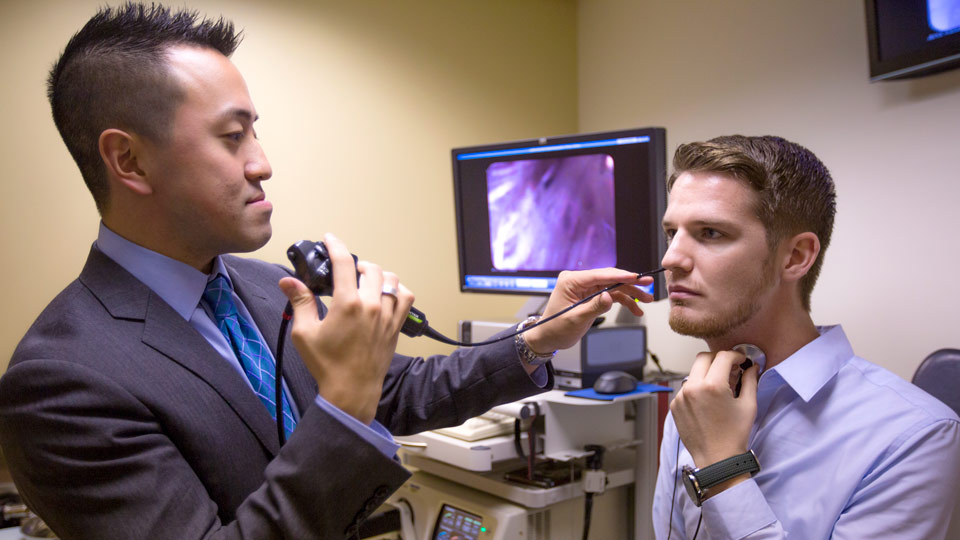Exploring the Area of Otolaryngology: What to Expect When You Seek Advice From an ENT
Otolaryngology, typically referred to as ENT, includes the medical diagnosis and treatment of throat, ear, and nose problems. For those experiencing related problems, getting in touch with an ENT expert can supply clarity and relief. Recognizing what to expect throughout such appointments is essential for reliable interaction and treatment. This summary will outline crucial facets of the ENT experience, including common factors for visits and the procedures associated with diagnosis and treatment.

Comprehending Otolaryngology: An Overview
Otolaryngology, typically referred to as ENT (Throat, ear, and nose) medicine, is a specific branch of medication that concentrates on the diagnosis and therapy of problems influencing these crucial locations of the human body. This area incorporates a wide array of problems, consisting of those associated to hearing, equilibrium, respiratory system function, and speech. Otolaryngologists are educated to take care of both surgical and clinical treatments, utilizing sophisticated strategies and technologies. Their experience extends beyond conventional ailments, attending to concerns such as allergies, sinus infections, and hearing loss. Furthermore, they play a crucial duty in the monitoring of head and neck cancers cells, providing complete treatment tailored to private person needs. In general, otolaryngology continues to be vital for preserving wellness and lifestyle in affected people.
Typical Factors to See an ENT Expert
Several people look for the experience of an ENT professional for a selection of factors, showing the diverse nature of conditions that influence the nose, throat, and ear. Usual problems consist of persistent sinusitis, which usually results in persistent nasal congestion and face discomfort. Allergic reactions and their connected signs and symptoms, such as itching and sneezing, additionally trigger brows through to these experts (Otolaryngology). Hearing loss, whether unexpected or steady, is another considerable factor for examination. On top of that, people may look for analysis for throat conditions, including persistent hoarseness or ingesting troubles. Sleep apnea, characterized by interrupted breathing during sleep, is regularly addressed by ENT specialists too. Each of these problems highlights the relevance of specialized care in handling intricate ENT-related health and wellness issues
Preparing for Your ENT Visit
When preparing for an ENT appointment, it is important to gather pertinent information and take into consideration any certain worries. Patients must compile an in-depth case history, including previous ear, nose, or throat issues, surgical procedures, and current medicines. Recording signs-- such as duration, severity, and regularity-- can supply important understandings for the ENT expert. Additionally, individuals need to prepare a list of questions they want to ask, making certain that all issues are addressed throughout the visit. Bringing along any relevant clinical documents or test results can even more aid the ENT in recognizing the individual's condition. People need to validate their consultation information, consisting of location, date, and time, to minimize any type of final complication. Proper preparation can improve the performance of the assessment and cause far better end results.
What to Anticipate During the Consultation
As the consultation begins, the patient can expect to participate in a detailed discussion with the ENT professional concerning their signs and clinical history. The professional will make inquiries regarding the period, frequency, and intensity of symptoms such as hearing loss, nasal blockage, or aching throat. In addition, the patient's previous clinical problems, drugs, and any kind of pertinent household history will be examined, assisting the professional in creating a additional info complete understanding of the client's health and wellness. The ENT may additionally inquire about way of living elements, such as exposure to allergens or toxic irritants. This open dialogue establishes a structure for the assessment, making sure that the individual's problems are addressed and setting the phase for any essential assessments or recommendations for treatment.
Analysis Examinations and Treatments in Otolaryngology
A series of diagnostic examinations and procedures are essential in otolaryngology to accurately evaluate and detect conditions impacting the nose, throat, and ear. Usual examinations include audiometry, which gauges hearing feature, and tympanometry, evaluating middle ear pressure. Nasal endoscopy allows visualization of the nasal flows and sinuses, while laryngoscopy examines the throat and singing cords. Imaging strategies, such as CT scans and MRIs, give in-depth views of head and neck structures. Allergy testing might also be carried out to identify triggers for sinus or respiratory concerns. These analysis tools make it possible for ENT professionals to create a thorough understanding of patients' problems, guaranteeing tailored and effective administration strategies. Appropriate medical diagnosis is vital for successful therapy outcomes in otolaryngology.
Therapy Alternatives Supplied by ENT Specialists
ENT specialists supply a variety of therapy choices customized to deal with certain problems affecting the throat, nose, and ear. These therapies vary from conventional methods, such as medicine and way of living modifications, to more invasive procedures. Allergies might be handled with antihistamines or immunotherapy, while chronic sinus problems could require nasal corticosteroids or sinus surgery. For hearing loss, ENT experts frequently advise listening devices or medical interventions like cochlear implants. In cases of throat problems, choices can include speech treatment or operations to remove obstructions. In addition, they might offer assistance for managing sleep apnea, consisting of making use of CPAP devices or medical interventions. On the whole, the goal is to enhance clients' top quality of life with individualized care and efficient treatment techniques.
When to Look For Follow-Up Treatment With an ENT
When visit this website to seek follow-up treatment with an ENT expert is crucial for managing continuous signs and symptoms or issues connected to nose, ear, and throat problems, identifying. Patients ought to take into consideration scheduling a follow-up visit if symptoms linger regardless of preliminary therapy, such as chronic ear pain, nasal congestion, or throat pain. Changes in hearing, equilibrium concerns, or uncommon nasal discharge might likewise call for additional analysis. Additionally, if a patient experiences adverse effects from prescribed medications or has actually gone through an operation, follow-up care is crucial to monitor recuperation and deal with any issues. Timely examinations can assure efficient management of conditions, prevent possible complications, and supply assurance concerning one's wellness. Seeking follow-up care advertises proactive health and wellness administration in otolaryngology.
Frequently Asked Concerns

What Qualifications Should I Try to find in an ENT Specialist?
When seeking an ENT specialist, one need to try to find board qualification, appropriate experience, and solid client reviews. In addition, reliable communication skills and a thoughtful technique can substantially improve the overall therapy experience.
How Do I Select the Right ENT for My Needs?
Picking the best ENT professional entails evaluating their qualifications, experience, and individual testimonials (ENT Clinic). It is vital to consider their interaction style and approach to treatment, guaranteeing they straighten with the individual's particular health and wellness demands and choices
Exist Any Kind Of Threats Connected With ENT Procedures?
The risks connected with ENT treatments might include infection, bleeding, anesthesia problems, and prospective damage to surrounding frameworks. Clients should discuss these dangers with their medical professional to comprehend individual worries and warranty notified decisions.
How Can I Manage Anxiety Prior To My ENT Consultation?
To take care of anxiety before an appointment, individuals can practice deep breathing workouts, picture positive results, prepare questions in breakthrough, and seek assistance from friends or family, fostering a feeling of confidence and calmness.
What Should I Do if I Experience Adverse Effects From Treatment?
The individual should immediately report them to their health care supplier if side effects from therapy occur. Modifications to therapy or additional interventions may be needed to guarantee safety and performance in managing their problem - Sinus. As the assessment starts, the individual can anticipate to involve in a detailed conversation with the ENT specialist concerning their signs and symptoms and medical history. These analysis devices allow ENT specialists to establish a complete understanding of clients' problems, making sure tailored and effective management plans. ENT professionals use a selection of therapy alternatives customized to attend to certain problems impacting see the ear, throat, and nose. When looking for an ENT expert, one ought to look for board qualification, appropriate experience, and solid person evaluations. Selecting the best ENT expert entails assessing their certifications, experience, and client testimonials